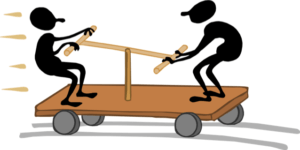A primary concern in meetings and information-gathering activities is getting good information—to build the right product the first time—and to make well-informed decisions. Significant trends show that groups are embedding the role of ‘facilitator’ in the culture and health of modern, especially holistic, organizations. Therefore, take strides to avoid poor facilitation.
“Perversely, organizations with the best human resource departments sometimes have less effective teams. That’s because HR tends to focus on improving individual rather than team behavior.”
— Diane Coutu, HBR, May 2009, pg 99
Group decision-making processes are more prevalent than ever. Intellectual capital is critical to the growth and profit of service organizations. Manufacturers are becoming “infomediaries” and sourcing production based on worldwide, not parochial, views. Innovation determines the future prosperity of most organizations:
Meta-trends Demand Facilitative Leadership
- Cultural modernization—the basic tenets of modern cultures include equality, personal freedom, and individual requirements.
- Economic globalization—In developed economies, where formal institutions sustain order and predictability, consensus is critical to survival.
- Universal connectivity—information technology continues to inundate us with capabilities and the “death of distance” when we can find what we need.
- Transactional transparency—ubiquitous computing and comprehensive electronic documentation make leaders and decision-makers exposed.
- Individual limitations—empirical evidence that groups make higher quality decisions and are better at addressing more difficult or complex challenges.
Problems With Poor Facilitation
Decision-making and information-gathering share two problems:
- The first is the communication gap between those who have the information (e.g., information technology) and those who need to use it to build something (eg, business community or product development).
- The invariable power struggle between the players involved exacerbates poor facilitation. Egos make building consensus a significant challenge.
Power Struggles With Poor Facilitation
The power struggles between various departments or business units are often the result of language differences. Frequently, power struggles are not intentional but occur because of differing perspectives around the same issue. Reconciliation may be critical to organizational success, particularly for proactive organizations that want to lead change rather than be changed.
Errors & Omissions Through Poor Facilitation
The most effective way to reduce the cost of reaching objectives is to reduce errors and omissions. Groups recall and remember more than individuals and are capable of using their input to create an integrative response. Consensus helps prevent errors, but more importantly, it helps prevent omissions.
Help Needed to Avoid Poor Facilitation
Numerous analytical methodologies, design methodologies, life cycle techniques, etc., have evolved to address errors in the planning and development phase. While methodologies work well in analysis and design, they have not successfully addressed the information gathering necessary to gather effective and timely input.
______
Don’t ruin your career by hosting bad meetings. Sign up for a workshop or send this to someone who should. MGRUSH workshops focus on meeting design and practice. Each person practices tools, methods, and activities every day during the week. Therefore, while some call this immersion, we call it the road to building high-value facilitation skills.
Our workshops also provide a superb way to earn up to 40 SEUs from the Scrum Alliance, 40 CDUs from IIBA, 40 Continuous Learning Points (CLPs) based on Federal Acquisition Certification Continuous Professional Learning Requirements using Training and Education activities, 40 Professional Development Units (PDUs) from SAVE International, as well as 4.0 CEUs for other professions. (See workshop and Reference Manual descriptions for details.)
Want a free 10-minute break timer? Sign up for our once-monthly newsletter HERE and receive a timer along with four other of our favorite facilitation tools, free.

Terrence Metz, president of MG RUSH Facilitation Training, was just 22-years-old and working as a Sales Engineer at Honeywell when he recognized a widespread problem—most meetings were ineffective and poorly led, wasting both time and company resources. However, he also observed meetings that worked. What set them apart? A well-prepared leader who structured the session to ensure participants contributed meaningfully and achieved clear outcomes.
Throughout his career, Metz, who earned an MBA from Kellogg (Northwestern University) experienced and also trained in various facilitation techniques. In 2004, he purchased MG RUSH where he shifted his focus toward improving established meeting designs and building a curriculum that would teach others how to lead, facilitate, and structure meetings that drive results. His expertise in training world-class facilitators led to the 2020 publication of Meetings That Get Results: A Guide to Building Better Meetings, a comprehensive resource on effectively building consensus.
Grounded in the principle that “nobody is smarter than everybody,” the book details the why, what, and how of building consensus when making decisions, planning, and solving problems. Along with a Participant’s Guide and supplemental workshops, it supports learning from foundational awareness to professional certification.
Metz’s first book, Change or Die: A Business Process Improvement Manual, tackled the challenges of process optimization. His upcoming book, Catalyst: Facilitating Innovation, focuses on meetings and workshops that don’t simply end when time runs out but conclude with actionable next steps and clear assignments—ensuring progress beyond discussions and ideas.





Reblogged this on Gr8fullsoul.